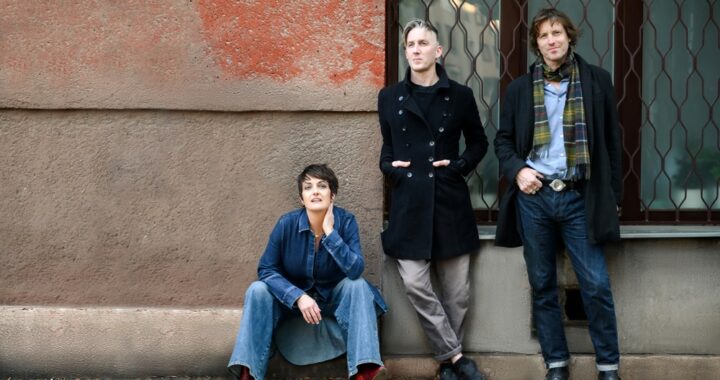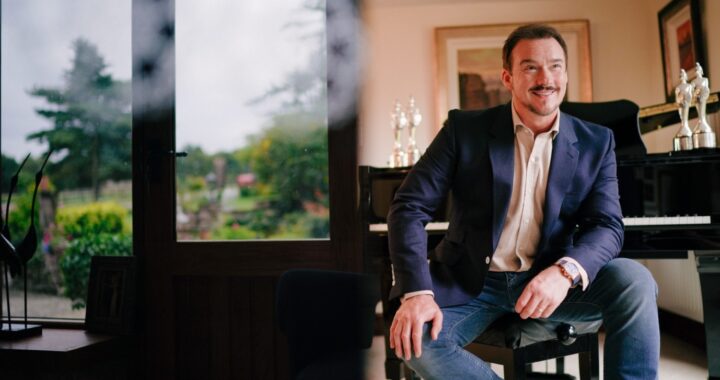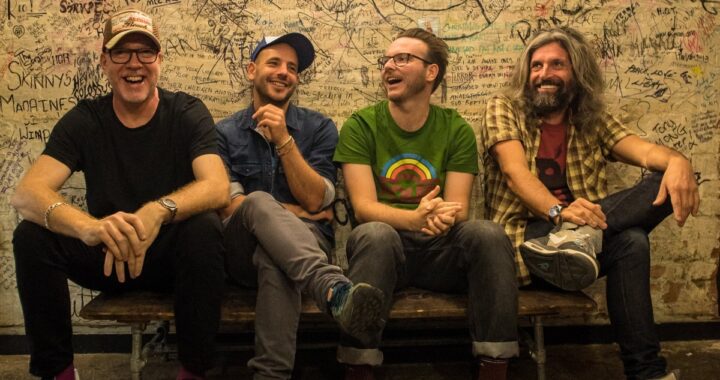Interview: Jack Ladder
8 min read
Australian singer-songwriter Jack Ladder (real name Tim Rogers) is one of contemporary music’s best kept secrets. At least, for now. His new record Playmates, a brazen, brilliant album that pays tribute to the sound and style of 80’s electronica, seems set to propel him into the stratosphere. Rogers is finally getting his due, after an incredible career filled with soulful, considered records and exceptional live performances.
 His debut album, Not Worth Waiting For was a dark, intelligent work, and his sophomore effort, Love Is Gone was voted record of the year by Who Magazine. Hurtsville, his third release, showcased Rogers’ incredible talent for penning lyrics, as well as his deep, powerful timbers.
His debut album, Not Worth Waiting For was a dark, intelligent work, and his sophomore effort, Love Is Gone was voted record of the year by Who Magazine. Hurtsville, his third release, showcased Rogers’ incredible talent for penning lyrics, as well as his deep, powerful timbers.
He has toured with the likes of John Cale, Bill Callahan and The Horrors. His live performances are noted not only for the incredible musicianship on display, but Rogers’ controlled, hypnotic stage presence. He is playing dates across the US this year, as well as embarking on another Australian tour. We spoke to Rogers ahead of his time abroad about music videos, his bandmates, and Australia’s best kept secrets…
Joseph Earp: How are you, and where in the world does our interview find you today?
Tim Rogers: I’m alive and well at my home in The Blue Mountains of New South Wales. The sun is in and out of phase and the chickens are scratching outside my door. I have a large pot of pressed coffee and no complaints.
JE: Playmates has a consistent tone and sound. Is that something you had in mind before you started writing the record, or did it evolve naturally that way?
TR: Making records with their own internal logic is something I’ve always tried to do. I had a strong sense of what I wanted for this album but it didn’t turn out as planned – they never do. It was a hugely collaborative effort between myself and Kim and all the better for it. I was looking for a particular kind of space and colour. That part we nailed.
JE: I love the evocative feel of the Her Hands music video. Where did the inspiration for the video come from? How was that shoot?
TR: The video was inspired by a scene from Brian De Palma’s Dressed To Kill. A man and a woman play cat and mouse in the Philadelphia Museum of Modern Art and you’re never sure who is following who. I felt the pacing and tension were in sync with the song. Finding a female to play opposite me is always tricky because I’m so tall. I didn’t want tocome off like some monstrous predator so we decided to use Hamish to play the leading lady. Obviously that throws a whole other series of questions into the plot, but that’s what I like – Questions. Steve Rogers, my eldest brother, directed and we had a great crew of people that he likes to work with. Russell Boyd lit it and he’s a master of light. He was the director of photography on Crocodile Dundee to give you some idea! We filmed it in a day at the Town Hall in Sydney which is an amazing space with a strong mix of French and English architecture that I thought worked really well with the music too.
[youtube id=”X2KQeqXl6ZM” width=”620″ height=”360″]
JE: Playmates features some incredible lyrical content. Who are the biggest influences on you as a lyricist?
TR: My partner inspires me to no end. I like Don DeLillo’s novels. I think Iggy Pop is one of the best lyric writers there ever was.
JE: How do you celebrate the release of a new record?
TR: Put on a show, invite everyone down and try make some money back.
JE: “The Dreamlanders” are an incredible band of musicians, and hugely impressive to see live. How did you meet the likes of Donny Benet, Laurence Pike and Kirin Callinan?
TR: I met Laurence first. He saw me performing solo at Spectrum in Sydney. I always thought he was a real motherfucker. I’d grown up watching Pivot (PVT) and didn’t for a second think he’d be into my stuff – but he liked where I was going and extended a hand if I ever needed a stick man. Needless to say he got the call.
Laurence recommended Donny for a session I was working on in Kangaroo Valley for an album that has long since been abandoned. After the session I asked him to play some shows with us. He used to sit down on a stool to play which I thought was super cool and weird. I could never figure out how old he was. My estimates have been getting younger ever since.
We played as a trio for a couple of years on and off from 2007 – 2008. Early 2009 we met Kirin when he was booked to open for us at The Hopetoun Hotel (RIP). We didn’t know what to make of him but he definitely left an impression. A couple of weeks later I fractured my left elbow in a freak accident. We had a national run of dates booked for the following month so my manager thought we should ask Kirin to help fill in on guitar as his old band Mercy Arms had recently broken up. It turned out that our parents lived around the corner from each other and due to our unfortunate circumstances we were both living back at home momentarily. We started carpooling to the city together – I think it was convenient for him to get a ride with me – but he ended up falling strangely into place with Don & Larry as we made our maiden voyage around Australia in support of my second record “Love Is Gone”. They weren’t called The Dreamlanders yet.
JE: Sharon Van Etten guests on Playmates – how did that collaboration come about?
TR: Between 2011 – 2013 we played exactly one show together. We didn’t tour Hurtsville as this line up. Things went sour for a while. This was our comeback in the hills of Byron Bay at the Bangalow A&I Hall opening for Beach House and Sharon Van Etten. It was 40 degrees and we played our pants off. Sharon was watching and really enjoyed the show so I gave her a copy of the vinyl. Later she wrote to me and said she loved the record and offered her assistance if we needed her. I had a couple of songs that I thought could use her voice and she sang her parts in from New York where she was working on Are We There. She has a generous and beautiful soul. She really brought a lot of depth to those songs.
[youtube id=”Wnc2UnHtboU” width=”620″ height=”360″]
JE: There seems to be a deeply ‘everyman’ quality to your lyrical content – I’m thinking of “I flip the burgers/While you work the till” in Hurtsville. Is there something that attracts you to the poetry of the everyday?
TR: I use simple language to communicate directly but I don’t think of myself as an “everyman”. It’s easier to discuss complicated things when you write simply. When I write about “work” it’s in a more metaphorical way. I’m not normally referring to washing cars if I sing about the car wash. I love language but I don’t do anything unless I have to. I’m not lazy but I hate waste.
JE: Was music a big part of your household when you were growing up?
TR: My parents aren’t musicians and we didn’t have any instruments lying around the house. Mum had The Best of Van Morrison on repeat in the car so that was a good start. My brothers were both massive music fans but a lot older and had moved out of home by the time I was a conscious person. They really helped me out once I started listening. I had an inclination towards tapping on things so when I tried out for the school band they put me on the drums. I became obsessed with the drums. I practiced all the time. My neighbour Felix was a great drummer and my parents sometimes asked him to keep an eye on me after school. He’d come over and teach me some new beats.
JE: At what point did you decide music was what you wanted to do with your life?
TR: In high school I had dreams of becoming a great jazz musician. When I stepped into the real world that dream crumbled pretty quickly. I always played music and eventually didn’t know what else to do. I think that maybe it’s a psychological condition. It can be debilitating. I have worked other jobs and tried to be professional but I’ve never been taken seriously. I feel privileged that in the end it’s kind of chosen me.
JE: How did you find playing live when you were first starting out? Is it something you have always enjoyed?
TR: When I started playing live I was comfortable because I was an instrumentalist and I practised. I knew what I was doing. When I started singing it got weird. You can’t rehearse singing for an audience, you just have to throw yourself to the lions. I’d accompany myself on guitar but leave large gaps because I could hear the rest of the arrangement in my head. This was mistaken for artfulness in the smaller underground circles. I was under the spell of some kind of insanity. I liked the confrontational aspect of it. I liked being heckled, getting a response. It was addictive. I started doing things to increase the reaction. Really trying to stretch the audiences goodwill. As I’ve got older I enjoy the entertainment aspect. I like pleasing the crowd.
[youtube id=”-CviqQkJ1Q0″ width=”620″ height=”360″]
JE: What is your favorite thing about Australia that people tend not to mention?
TR: Wombats. Everyone goes on about the Kangaroo and Koala. I don’t know, maybe wombats are getting more press now. Also Don Walker, the greatest Australian songwriter.
JE: If you couldn’t be a musician, what would your dream career look like?
TR: Fisherman / Housecat
JE: When push comes to shove, what is your favorite record?
TR: Fred Neil – Bleeker & MacDougall
JE: How would you characterize the Australian alternative music scene at the moment?
TR: Competitive.
JE: Tell me something you’ve never told an interviewer before.
TR: I’ll tell you later.
JE: You’re touring the states this year. What can fans expect from your upcoming show?
TR: The genuine article.
Jack Ladder and the Dreamlanders tour the States this year. Tour dates can be found here.



